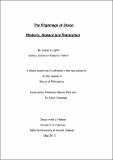| dc.contributor.advisor | Ellis, Steven G. | |
| dc.contributor.advisor | Forrestal, Alison | |
| dc.contributor.author | Loughlin, Susan Mary | |
| dc.date.accessioned | 2014-06-20T09:56:00Z | |
| dc.date.issued | 2013-05-12 | |
| dc.identifier.uri | http://hdl.handle.net/10379/4400 | |
| dc.description.abstract | The Henrician phase of the English Reformation should, arguably, be called an experiment. A reformation pre-supposes that there was a need or desire for reform and the evidence of a genuine, widespread theological conviction would need to be present. The label Henrician religious experiment or the description Henrician religious policy appear to be more fitting. The Pilgrimage of Grace in 1536, the largest uprising of the Tudor period, forms the centrepiece for this thesis as a case study for the investigation of this hypothesis.
This thesis will review the evidence for opposition to the Crown's religious changes and highlight the propaganda, patronage and retribution used in the enforcement of the government's policy. The Pilgrimage of Grace is useful in illuminating the wider themes under consideration. Although the motivation of the participants has been the subject of debate among historians, there is an abundance of evidence to support the contention that the rebellion was primarily motivated by religious concerns. The evidence to support the religiosity of the rising will be presented and discussed here. The thesis will also examine the official government rhetoric and propaganda as well as identifying the patronage and reward the regime used as a method of control. The thesis will endeavour to gauge the impact the Henrician religious innovations had upon the North of England in the aftermath of the rebellion. | en_US |
| dc.rights | Attribution-NonCommercial-NoDerivs 3.0 Ireland | |
| dc.rights.uri | https://creativecommons.org/licenses/by-nc-nd/3.0/ie/ | |
| dc.subject | Pilgrimage | en_US |
| dc.subject | Grace | en_US |
| dc.subject | Rebellion | en_US |
| dc.subject | Religion | en_US |
| dc.subject | Henry VIII | en_US |
| dc.subject | England | en_US |
| dc.subject | Department of History | en_US |
| dc.subject | School of Humanities | en_US |
| dc.title | The Pilgrimage of Grace: Rhetoric, Reward and Retribution | en_US |
| dc.type | Thesis | en_US |
| dc.contributor.funder | NUIG: College of Arts - Fellowship | en_US |
| dc.local.note | This thesis examines the Pilgrimage of Grace, 1536, the largest uprising against a Tudor monarch. The rebellion is used to highlight hostility to Henry VIII's religious changes and explores the Crown's methods of compliance: reward and retribution. Some rebels managed to escape punishment and became loyal servants of the Crown. How and why was this achieved? and what were the consequences for the North of England? | en_US |
| dc.description.embargo | 2019-12-12 | |
| dc.local.final | Yes | en_US |
| nui.item.downloads | 1688 | |


